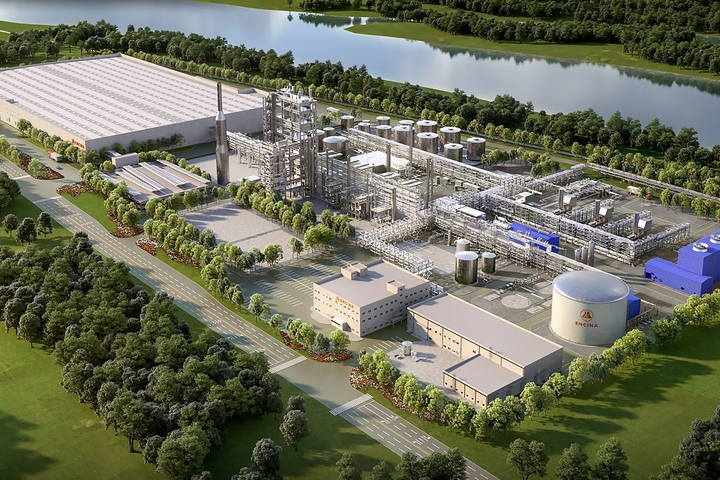BASF
Purchase agreement with Encina to secure supply of recycled benzene / No plant in sight yet
By Plasteurope.com staff
It is not yet clear when pyrolysis specialist Encina Development Group (The Woodlands, Texas, USA; www.encina.com) would be able to supply the first batch of the BTX/P aromatics fraction recycled from plastics waste that it advertises. Nevertheless, BASF (Ludwigshafen, Germany; www.basf.com) has concluded a long-term purchase agreement with the recycler for benzene produced through the process.
It is not yet clear when pyrolysis specialist Encina Development Group (The Woodlands, Texas, USA; www.encina.com) would be able to supply the first batch of the BTX/P aromatics fraction recycled from plastics waste that it advertises. Nevertheless, BASF (Ludwigshafen, Germany; www.basf.com) has concluded a long-term purchase agreement with the recycler for benzene produced through the process.
 Rendering of Encina’s circular manufacturing facility (Photo: Encina) |
According to the German giant, the first deliveries will be made to three BASF sites in the US and two in Europe, from 2028. The two sites in Europe are likely to be Ludwigshafen and Antwerp, Belgium, where BASF itself currently operates benzene production facilities. In the US, these are to be Freeport, Texas, and Geismar, Louisiana. When asked by Plasteurope.com, a BASF spokesperson refused to divulge the planned quantity of recycled benzene. The company processes a total of 1.5 mn t/y of primary benzene. Taking Encina’s current plant size into account, it could supply up to 400,000 t/y of benzene from one plant with a yield of 70% to 80% – however, BASF is not the only interested party. Covestro and Braskem have also expressed interest and concluded similar contracts.
It nevertheless remains unclear how much the agreement with BASF is actually worth. Encina recently cancelled its plans for the construction of a multi-billion-euro recycling plant in the state of Pennsylvania, which it had been pursuing since 2022. According to these plans, the plant was due to go into operation in 2024. The official reason given for the cancellation was a redesign; the plant would now be able to process 450,000 t/y of plastics waste instead of 540,000 t/y. The reason could also supposedly be the increasing resistance from US citizens.
Related: Martin Brudermüller: “We have a real earnings problem at the Ludwigshafen site”
It remains to be seen whether the realisation of the plant in the US is likely, as Encina is now citing “development projects in key global markets such as Saudi Arabia and Southeast Asia” as an alternative. But no matter where, the company has only four years left to find a location, redesign, build, and set up supply chains for a pre-sorted plastic fraction from household waste if the contract with BASF is to be honoured. For a plant in Asia, the supply of waste in particular could pose a problem, as there are hardly any developed collection and logistics solutions for such materials in the countries on the continent. BASF said that agreements such as the one recently concluded could promote “further development of this infrastructure and the availability of plastics waste for the circular economy”.
BASF intends to use the recycled benzene to improve the mass balance in its portfolio of Ccycled materials; there are currently around 240 products for various applications. These include food packaging, EPS transport boxes for temperature-sensitive medicines, polyamides for the automotive industry, and textiles.
08.07.2024 Plasteurope.com 1151 [255661-0]
Published on 08.07.2024

 German version of this article...
German version of this article...